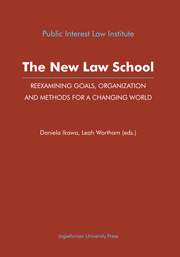Book contents
- Frontmatter
- Contents
- Preface
- Acknowledgments
- Introduction
- Part One Goals of Legal Education
- Part Two Law School Governance
- Part Three Optimal Academic Curricula and Teaching Methods
- Chapter 3 Interactive Teaching Methodologies in Ukrainian Legal Education: Balancing between State of the Art and a Newfangled Whim
- Chapter 4 The Challenges of Higher Legal Education in the Kyrgyz Republic and the Peculiarities of Educational Process at the AUCA Law Department
- Chapter 5 The Environmental Law Clinic: A New Experience in Legal Education in Spain
- Chapter 6 The Judicial Practice Center: The Connection between Theory and Socially Responsible Professional Practice
- Part Four The Academic Career in Law
- Appendix
Chapter 3 - Interactive Teaching Methodologies in Ukrainian Legal Education: Balancing between State of the Art and a Newfangled Whim
from Part Three - Optimal Academic Curricula and Teaching Methods
Published online by Cambridge University Press: 05 September 2014
- Frontmatter
- Contents
- Preface
- Acknowledgments
- Introduction
- Part One Goals of Legal Education
- Part Two Law School Governance
- Part Three Optimal Academic Curricula and Teaching Methods
- Chapter 3 Interactive Teaching Methodologies in Ukrainian Legal Education: Balancing between State of the Art and a Newfangled Whim
- Chapter 4 The Challenges of Higher Legal Education in the Kyrgyz Republic and the Peculiarities of Educational Process at the AUCA Law Department
- Chapter 5 The Environmental Law Clinic: A New Experience in Legal Education in Spain
- Chapter 6 The Judicial Practice Center: The Connection between Theory and Socially Responsible Professional Practice
- Part Four The Academic Career in Law
- Appendix
Summary
Introduction
As a 2007 survey on the state of legal education in Ukraine indicated, students, faculty members, and potential employers are generally dissatisfied with the current methods of teaching in law schools. In particular, interviewees in the 2007 survey invariably condemned so-called traditional methods of teaching such as lecturing, seminar questioning, and writing of abstracts as ineffective and unfit for the purpose of preparing critically minded and socially responsible lawyers. At the same time, both students and faculty members generally remain skeptical about the introduction of computer-based interactive teaching techniques, which have recently been launched in many law schools in Ukraine. Such new teaching methods are often criticized for being “faceless,” depersonalized, and too mechanical. Many students and teachers view any innovative approach aimed at interactive learning as unnecessary and as “new fashion whims” that distract students from focusing on “black-letter law.”
This chapter will focus on the problem of finding a balance between involving every student in rather large classes (up to 30 students) in learning “how to think like a lawyer” on the one hand, and ensuring that students are instructed in particular areas of law, on the other.
This chapter will explore how the introduction of interactive teaching techniques has been received at the Economics and Law Faculty of Donetsk National University. In particular, we will examine the main challenges faced by teachers and difficulties in tailoring such methods to the students’ needs, as well as the author's personal experience in developing a course almost completely based on interactive approaches.
- Type
- Chapter
- Information
- The New Law SchoolReexamining Goals, Organization and Methods for a Changing World, pp. 47 - 56Publisher: Jagiellonian University PressPrint publication year: 2010



